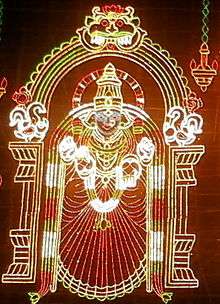Padmavathi
Padmavati (Telugu: పద్మావతి, Sanskrit: पद्मावती) also known as Alamelu manga[1] (often spelled "Padmavathi" or "Padmavathy"), is a Hindu devi. She is the avatar of Lakshmi, the Hindu Goddess of Elemental Prakriti. Padmavati is the consort of Sri Venkateswara and an avatar of Goddess Mahalakshmi. The name Padmavati is Sanskrit for "she who emerged from lotus". The most prominent shrine of Padmavati is Sri Padmavati Ammavari Temple situated at Tiruchanur, a suburb of Tirupati City. Tradition dictates that every pilgrim to Tirupati must offer obeisance at this temple before visiting the Tirumala Venkateswara Temple.
| Padmavati | |
|---|---|
 | |
| Devanagari | पद्मावती |
| Telugu | పద్మావతి |
| Affiliation | Lakshmi |
| Animals | Elephant |
| Mount | Pink Lotus |
| Parents | Akshayaraja |
| Consort | Venkateswara |
Etymology
Padmavati is a sanskrit name which means "she who emerged from lotus". She is also referred to as Alamelumanga in Telugu[2] and Alarmelmangai in Tamil which translates conjoint of the words Alar (lotus) and Mel(aloft or up); Mangai means "(lady)".
Legend
Particular devotions
Padmavathi is a major deity in Hinduism worshipped as an aspect of Goddess Lakshmi.It is believed that her intercession is indispensable to gaining the favour of the lord, it is also believed that Lakshmi is co-omnipresent, co-illimitable and the co-bestower of moksham along with Lord Vishnu. Nammalwar in his Thiruvaymozhi says agalakillEn iRaiyum enRu * alarmEl mangkai uRai mArbA! which translates as "Goddess Lakshmi will not away from your (venkateswara) heart,always stay with you (him)."[3]
Poet Sri Annamacharya, was a staunch devotee of Padmavathi. Most of his keertanas is either inspired or centers around the deity. Many of the most famous and popular Kritis of Annamacharya personify her benevolence and grace.
See also
- Padmavathi Temple, Tiruchanur
- Tiruchanur
- Venkateshwara
- Sri Padmavati Mahila Visvavidyalayam, a university named after Padmavati
References
- South India handbook: the travel guide By Robert Bradnock, Roma Bradnock-Source-Google Books
- "Google book-Core of Karnatic Music, meaning of alamelu in Telugu".
- "thiruvAymozhi 6-10 - ulagamuNda" (PDF).
External links
- The Tirumala-Tirupati Devasthanam website
- Sri Venkatdhvari Kavi's Sri Lakshmi Saharam Praising Alarmelmanga Thayar
